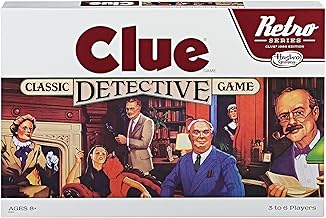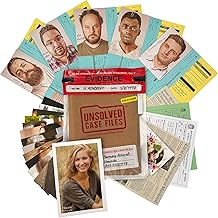Unlock Young Minds: Mystery Logic Games for Kids That Build Super Thinkers
Children are natural explorers and investigators, always asking “Why?” and “How?”. This innate curiosity makes them perfectly suited for the captivating world of mystery logic games. Far more than just fun pastimes, these engaging activities are powerful tools for developing crucial reasoning skills, fostering critical thinking, and nurturing the next generation of problem-solvers.
In this comprehensive guide, we’ll dive into what makes mystery logic games so beneficial, how to choose the right ones for your child’s age, and practical tips to maximize their learning potential through exciting play.
What Are Mystery Logic Games and Why Are They Perfect for Kids?
Defining the Fun: More Than Just Puzzles
Mystery logic games present a scenario or a problem that requires players to use clues, eliminate possibilities, and apply deductive reasoning to arrive at a solution. Think of it as being a detective, but for fun! These games often involve:
- Unraveling a Story: Who stole the cookie? Where is the lost pet?
- Solving a Dilemma: How do you get everyone across the river?
- Identifying Patterns: What comes next in the sequence?
- Deductive Grids: Using a grid to cross-reference clues and eliminate options.
Unlike simple memory games, mystery logic games demand active engagement with information, encouraging children to think deeply and strategically.
The Brain-Boosting Benefits
Engaging with these games provides a wealth of cognitive advantages that extend far beyond playtime:
- Problem-Solving Skills: Children learn to break down complex problems into smaller, manageable steps.
- Critical Thinking: They evaluate clues, determine relevance, and question assumptions.
- Deductive Reasoning: The core skill – drawing logical conclusions from given premises and eliminating false ones.
- Pattern Recognition: Identifying recurring themes, sequences, and relationships in information.
- Memory and Focus: Retaining information, following multi-step instructions, and staying concentrated on the task.
- Patience and Perseverance: Learning to stick with a challenge, even when the solution isn’t immediately obvious.
- Spatial Reasoning: Many games involve moving pieces or understanding layouts, enhancing spatial awareness.
- Creativity: Sometimes, the solution requires thinking outside the box, fostering innovative thought.
Choosing the Right Mystery Logic Games for Different Ages
To ensure maximum engagement and learning, it’s crucial to select games appropriate for your child’s developmental stage. Here’s a general guide:
Preschool & Early Elementary (Ages 3-6): Laying the Foundation
At this age, focus on visual, hands-on games with simple rules. The goal is to introduce basic logical concepts without overwhelming them.
- Focus: Simple matching, sequencing, cause-and-effect, “spot the difference” activities.
- Examples: Simple “Where’s Waldo?” style books, basic pattern block games, story-based picture mysteries where they find the missing item, “Guess Who?” with fewer characters.
- Tips: Keep playtimes short, offer assistance, and celebrate effort.
Middle Elementary (Ages 7-9): Stepping Up the Challenge
Children in this age group are ready for more complex rules and multi-step deduction. Introduce games that require a bit more planning and analysis.
- Focus: Simple logic grid puzzles, “Clue Jr.” type deduction, basic coding games, games with an element of strategic planning.
- Examples: Rush Hour (ThinkFun), Clue Jr., beginner detective kits, apps with guided logic puzzles, games that involve following a sequence of commands.
- Tips: Encourage them to talk through their thought process, introduce simple note-taking, and play collaboratively.
Late Elementary & Pre-Teens (Ages 10-12+): Master Detectives
Older children can handle intricate plots, advanced deduction, and longer gameplay sessions. They’re ready for true “mystery” experiences.
- Focus: Advanced logic grid puzzles, elaborate mystery board games, escape room style games, complex coding challenges, critical thinking scenarios.
- Examples: Classic Clue, Sherlock Holmes Consulting Detective, Exit: The Game series (kids versions), advanced Sudoku/Kakuro, online mystery games that require research.
- Tips: Encourage independent problem-solving, facilitate discussions about different strategies, and consider collaborative play for more complex games.
Top Picks: Popular Mystery Logic Games & Activities
Here are some highly recommended games that consistently deliver on both fun and educational value:
- Rush Hour (ThinkFun): A sliding block puzzle where players deduce how to move cars to free their red car from a traffic jam. Excellent for spatial reasoning and sequential logic. (Ages 8+)
- Clue / Clue Jr.: The classic murder mystery board game (or its simpler junior version) where players gather clues to deduce the culprit, weapon, and location. (Clue Jr. 5+, Clue 8+)
- Logic Grid Puzzle Books/Apps: Pure deductive reasoning where players use a series of clues to fill in a grid and solve a mystery. Available in various difficulty levels. (Ages 7+)
- Escape Room Board Games (e.g., Exit: The Game, Unlock! Kids): These bring the popular escape room experience home, challenging players to solve riddles, puzzles, and mysteries to “escape.” (Kids versions 6+, standard versions 10+)
- Robot Turtles / Code & Go Robot Mouse: Introduce coding logic by having children program a robot to navigate a maze and achieve a goal. Great for sequential thinking and problem-solving. (Ages 4+)
- Brain Games (e.g., Spot It!, Set): While not strictly “mystery,” these games rapidly develop pattern recognition, visual processing, and quick deductive reasoning skills. (Ages 6+)
- Detective Kits & Role-Play: Hands-on tools like magnifying glasses, fingerprint kits, and invisible ink encourage imaginative investigation and practical problem-solving. (Ages 5+)
- Mystery Books (Choose Your Own Adventure/Interactive): Reading that engages critical thinking as children make choices that affect the story’s outcome, often leading to a mystery’s solution. (Ages 7+)
Practical Tips for Parents: Maximizing the Learning Fun
Your involvement can significantly enhance your child’s learning experience with mystery logic games:
- Play Together: Especially for younger children, playing alongside them allows you to model problem-solving strategies and scaffold their learning.
- Don’t Give Away Answers: Resist the urge to solve it for them. Instead, guide them with questions like, “What does that clue tell us?” or “What if we try this?”
- Celebrate Effort, Not Just Solutions: Praise their persistence, their logical thinking process, and their willingness to try, even if they don’t solve it immediately.
- Make it a Habit: Short, regular sessions (15-30 minutes) are often more effective than infrequent, long ones.
- Diversify Game Types: Expose them to different kinds of logic games to develop a broader range of cognitive skills.
- Connect to Real Life: Discuss how detectives use clues, how scientists solve problems, or how engineers design solutions.
- Encourage Discussion: Ask “How did you figure that out?” or “What was your strategy?” to help them articulate their thought process.
Conclusion
Mystery logic games are an invaluable resource for children’s cognitive development. By transforming learning into an exciting adventure, these games empower young minds to become confident problem-solvers, astute critical thinkers, and masterful deductive reasoners. As they unravel mysteries and conquer challenges, children aren’t just having fun – they’re building the essential skills they’ll use throughout their academic careers and beyond.
So, why wait? Introduce your child to the thrilling world of mystery logic games today and watch them unlock their full thinking potential!
Related Amazon Products

Hasbro Gaming Retro Series Clue 1986 Edition Board Game, Classic Mystery Game for Kids, Family Board Games for 3-6 Players, Ages 8+ (Amazon Exclusive)

Unsolved Case Files | Ashcroft, Harmony - Cold Case Murder Mystery Game - Can You Solve The Crime? Who Killed Harmony? For Ages 14 and up

Guess Who? Board Game with Classic Characters by Winning Moves Games USA, Classic Children's Mystery Board Game of Deduction for 2 Players, Ages 6+ (1191)
As an Amazon Associate I earn from qualifying purchases.







